#study tips and hacks
Explore tagged Tumblr posts
Text
quit brainrot. unfollow trolls. read essays. go down rabbit holes. have a calendar. maintain a todo list. read old books. watch old movies. turn on dnd. walk with intent. eat without youtube. chew more. train without music. plan for 15 mins. execute. organise your desk. take something seriously. read ancient scripts. act fast. find bread. eat clean. journal. save a life. learn to code. read poetry. create art. stay composed. refine your speech. optimise for efficiency. act sincere. help people. be kind. stop doing things that waste your time. follow your intuition. craft reputation. learn persuasion. systemise your day (or don't). write. write. write. write more. iterate violently. leave your phone at home. walk to the grocery store. talk to strangers. feed the dogs. visit bookstores. look for 1800s novels. experience art. then love. sit with a monk and offer them lunch. don't talk shit about people. embody virtue. sit alone. do something with your life. what do you want to create? turn off your mind. play. play a sport. combat sports. notice fonts in trees. fall in love. notice patterns on a table. visualise it. talk to people with respect. don't hate. be loving. be real. become yourself. cherrypick your qualities. discard the useless. rejections aren't permanent. invite what aligns. accept what does not. read great people. be different. choose different. do great work. let it consume you. lose your mind. value your time. experience life.
#n1pp#glow up#glow up tips#glow up journey#glow up hacks#glow up guide#glowingskin#it girl#becoming it girl#it girl moodboard#it girl aesthetic#it girl guide#it girl outfit#that girl#that girl guide#that girl aesthetic#that girl moodboard#that girl outfit#becoming that girl#aesthetic#motivation#study motivation#motivating quotes#get motivated#self care#self love#self improvement#be confident#vision#brainfuck
8K notes
·
View notes
Text
Check out
If you haven't already, check out the Cool Study Wizard blog!!
#student life#study tips and tricks#that study tips#study tips and hacks#what's study skills#are studying tips#to study tips#what are good study tips#how study skills for students#study tips to become a topper
0 notes
Text
✧ how i stay productive during summer break (while still having fun!) ✧





hey lovelies! ✨
summer break is finally here and honestly? it's my favorite time to both relax and get things done. i know that sounds contradictory but trust me, finding that sweet balance between productivity and fun is totally possible! after years of either doing absolutely nothing or burning myself out, i've finally found my perfect summer rhythm.
first things first: the morning routine ✨
i've learned that my day flows so much better when i start it intentionally. i wake up around 8 or 9 (not too early because we deserve some extra sleep!), make my bed immediately (small win!), and spend 15 minutes journaling before checking my phone. this tiny habit has literally changed everything for me.
my summer morning essentials:
iced coffee with oat milk and a tiny bit of vanilla
a cute journal that makes me excited to write in it
10 minutes of stretching by my window
a super quick skincare routine (sunscreen is non-negotiable!)
creating a flexible structure 🤍
the secret to summer productivity is having just enough structure without feeling trapped. i divide my days into three parts:
morning: productive focus time (2-3 hours max) afternoon: flexible time for errands, friends, or projects evening: pure relaxation and fun
this way, i never feel like i'm missing out or falling behind. the key is being realistic about what you can actually accomplish in a day. i used to make these impossible to-do lists and then feel awful when i couldn't finish them.
my productivity non-negotiables:
i always make sure to do at least one productive thing each day, even if it's small. some of my favorites:
reading 20 pages of a book
organizing one small area of my room
working on a creative project for 30 minutes
learning something new for my blog
planning content or taking photos
balancing productivity with summer fun ✨
here's my little secret: schedule your fun just like you schedule your work! this sounds silly but it actually helps me look forward to both. some of my favorite summer activities that feel refreshing but don't derail my productivity:
morning walks with an audiobook
afternoon picnics where i can also read or brainstorm
coffee shop work dates with friends
sunset swims after a productive day
weekend day trips that recharge my creativity
my favorite productivity tools:
a paper planner (something about writing things down just works better for me)
the forest app to stay off my phone when focusing
aesthetic notion templates for organizing my projects
time blocking in my calendar with cute colors
lo-fi summer playlists that help me concentrate
remembering the why 🤍
summer isn't just about getting things done or having the perfect instagram moments. it's about growing, reflecting, and creating memories that will make you smile in december when it's freezing outside. productivity should support your joy, not replace it!
i've found that my happiest summer days are when i accomplish something meaningful in the morning and then have the freedom to be spontaneous in the afternoon and evening. balance isn't perfect every day, and that's okay too.
what are your favorite ways to stay productive during summer break? i'd love to hear your tips too!
xoxo, mindy 🤍

#productivity tips#summer break#summer productivity#self improvement#college girl tips#study tips#balance#productivity hacks#summer routine#morning routine#summer vibes#aesthetic productivity#journaling#self care#time management#college student#college life#productivity aesthetic#summer activities#planner tips#notion template#coquette aesthetic#soft girl#glowettee#study motivation#productive summer#summer goals#summer planning#intentional living#slow living
388 notes
·
View notes
Text
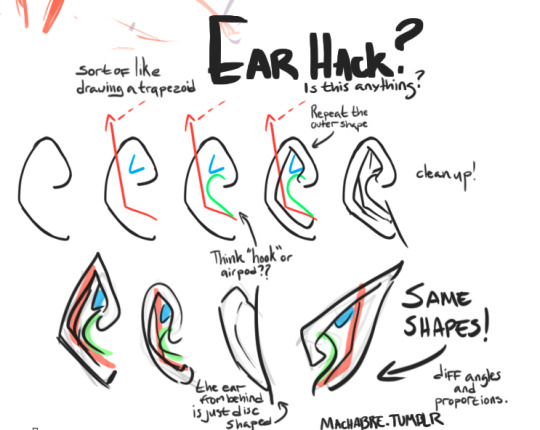
hmmm been thinking about stylizing ear shapes to draw super quick and brainless ears. Uploading it on the slim possibility it helps someone other than myself
disclaimer: not a teacher, not a pro artist or anything.
#art tips#drawing ears#drawing tutorial#first 'tutorial' I've uploaded lmao so no promises it's anything#art hacks#wipsnpractice#you know wht my ass needs to study? eyes and noses fuck they are so hard to dial in cleanly im jealous of any1 who can just. Draw an eye#fcknn sorcery
216 notes
·
View notes
Text
100 Hobbies To Try
Update: I wrote this at like 1 AM, so I was kind of half-asleep lol. A few people brought up that there were a bunch of duplicates in the list, sorry about that! I redid the whole list and ordered them alphabetically to avoid any repeating words. Hope you find the new list much more helpful!
Hobbies are a great way to practice self-care, and to have as a stress reliever. As uni students, we often find ourselves stressed out about our academic responsibilities, projects deadlines, and even financial concerns. We need some way to let out those stresses, and hobbies are one way to do it. You don't have to be good at them, you just have to enjoy doing them!
Here's a list:
Acrylic pouring
Antiquing
Archery
Astrology
Astronomy
Baking
Beekeeping
Bird watching
Bookbinding
Calligraphy
Canoeing
Candle making
Cartography
Chess
Checkers
Collecting coins
Collecting crystals
Collecting funko-pops
Cooking
Crochet
Crossword puzzles
Cycling
Dancing
Diving
DIY electronics
DIY home improvement
Drawing
Embroidery
Fencing
Filming
Fishing
Frisbee golf
Gardening
Genealogy
Geocaching
Glassblowing
Guitar
Homebrewing
Hiking
Horseback riding
Hot air ballooning
Ice skating
Inline skating
Jigsaw puzzles
Juggling
Kayaking
Kite flying
Kite surfing
Knitting
Lego building
Letterboxing
Magic tricks
Martial arts
Meditation
Metalworking
Model airplanes
Model building
Model rockets
Model trains
Mountain biking
Origami
Paper folding
Painting
Paragliding
Parkour
Piano
Photography
Podcasting
Pottery
Programming
Puzzle solving
Quilting
Rappelling
Reading
Rock climbing
Rollerblading
Running
Sailing
Sculpting
Sculpture carving
Scrapbooking
Scuba diving
Singing
Skiing
Soap carving
Soap making
Stand-up comedy
Stand-up paddleboarding
Stained glass crafting
Stargazing
Surfing
Traveling
Urban exploration
Urban farming
Virtual reality gaming
Web design
Wine making
Wine tasting
Writing
Yoga
#studyblr#study tips#study advice#study hacks#study tricks#university#school tips#student#student life#study motivation#hobbies#selflove#self care#self love#self improvement#self healing#mental health#emotional health#coping#coping mechanism#school advice#high school#school#students#college#uni student#university student#collegelife#college life#exams
785 notes
·
View notes
Text
weird language study tip; look up qna questions and answer them in your target language. extra points for pretending to be a youtuber.
#langblr#language learning#studyblr#language stuff#foreign languages#languages#studying#language learning tip#langblr study tip#langblr tip#language hack
57 notes
·
View notes
Text
if you are someone who struggles with motivating yourself to attend to your chores, take care of yourself, or feel drained by the thought of hoarding so much responsibilities, i want to share a tip.
if you happen to be standing for some reason, try to complete all tasks that you usually do up standing. so for me, once i am on my feet, i do a sequence of activities like brushing my teeth, washing my face, ironing my clothes, brushing my hair, organizing my stuff for college, making my bed etc. without taking any break and i am able stack around 5 tasks comfortably. also, once the momentum is built, it gets easier!
similarly, if i am at my desk, sitting, i usually have my laptop there and always some work that needs to get done for college, admin or miscellaneous purposes. i try to do as much as i can.
this is particularly helpful for me because i am a big bedrot. especially when i am in pain or uncomfortable in general.
i just thought maybe it will help someone out there. this same hack might go in vain for me in a few weeks lol and i am just always figuring it out to push myself to be a functioning adult.
anyways, i hope u r taking care ♡
#shibu said#productivity#self care#productivity tips#being productive#motivation#study motivation#chores#gentle reminders#mental health#self improvement#chronic fatigue#emotional distress#to do list#adult tips#adulting#mental health support#depression tips#mental wellbeing#text post#txt#positivity#life hacks#feeling productive#productivity hacks#life lessons
230 notes
·
View notes
Text
Study Tip #2



How to not be overwhelmed by the vastness of your study syllabus?
I used to look at my one subject and get excited, but then I'd look at the another and another and another. And I'd get so excited to study that I wouldn't even want to study anymore. It felt like something that's too much to be done in the current moment. Or even in the whole day, week, month or year.
The way I fought through this is by sheer willpower. I do not exactly know of a hack. What I've done could be called a hack, because it worked for me perfectly but it takes a lot of will power that, let me tell you, you're definitely capable of.
Few steps that I used to not let myself feel overwhelmed before studying:
1: Let yourself actually feel overwhelmed. Don't get scared of it, don't shy away from it. Accept it. Whatever thoughts come to your mind, accept it. That's why I'm telling you to have some time set aside to analyse the syllabus. All of it. And when you do get overwhelmed, take a break, go for a walk and come back with the decision of doing what's in point 2.
Example:Lets say you have 15 chapters of English, 10 Chapters of Chemistry and 20 chapters of Biology. All of them are a little complex and lengthy. Go through the textbook, or the contents to atleast familiarise yourself with it all.
2: Now that you have good understanding of your syllabus, you must have atleast mentally broken it down into various parts. Now pick a part that you can do.
Example:Lets say you have picked up Cell Cycle from biology or you've picked up learning about particular poem from English or you've picked up Periodic Table from chemistry.
3: Often times we overestimate our boundaries specially if we're doing something for the first time, or after a long time. So, if you're panicking because you weren't able to finish the task you put for yourself (point 2), it's alright. You did great. Even if you have done is thousands times before, it's alright. Give yourself atleast 3-5 tries before judging yourself. That means, wait for the next 3-5 tasks. You'd likely be able to completely atleast 1 of them. How?
Example: Now, you realised that you weren't able to finish studying the whole chapter in a day. You're panicking but hold on, darling, let's take a deep breath, focus and will yourself to stay strong. Now, take one of these, let's say the cell cycle, break it down- 1. Read the contents of the chapter in text book.
2. Look at the diagrams, understand them, make them.
3. Read one topic at a time, let's say, Mitosis.
4. Do the questions of Mitosis.
5. Go to the next thing.
4: This time while setting how big or small that task should be, think about your last boundary: were you able to just scratch the line of the surface or were you far behind? And then set your next goal or task according to that.
One of the very important things to remember is that you shouldn't lose your hope. Everything is do-able. You just need to perhaps look at it for the 2nd or 3rd time. But you can do it.
- Tanishka.
Pictures from pinterest. Credit to the owners.
#study aesthetic#100 days of productivity#desi academia#light academia#productivity challenge#study motivation#studyblr#studyblr community#studying#you're doing amazing#study tips#study hacks#study inspiration
198 notes
·
View notes
Text
Unlocking memory mastery 🧠Cognitive hacks for long-term retention
Spaced repetition 🗓️
Instead of massed practice (cramming), spaced repetition involves reviewing material at increasing intervals. This technique has been proven to enhance long-term retention by leveraging the spacing effect, allowing you to remember information more effectively over time.
Memory palaces 🪑
Discover the ancient art of memory palaces, a method that involves associating information with specific locations in a familiar building or spatial environment. By mentally navigating through these spaces, you can easily recall the information linked to each location.
Mnemonics and acronyms 🔤
Transform complex information into memorable acronyms or mnemonic devices. These creative memory aids can help you encode and retrieve information more efficiently by linking it to familiar or vivid associations.
Visual imagery 👀
Embrace the power of visual imagery to enhance memory. Create mental images or mind maps that represent the information you're trying to remember. Visualizing concepts can make them more concrete and easier to recall.
Teach someone else 👩🏻🏫
The act of teaching someone else what you've learned can solidify your own understanding and retention of the material. Whether it's explaining concepts to a friend or writing a study guide for a classmate, teaching others reinforces your own knowledge.
Dual coding 🤹🏽♀️
Combine verbal and visual information to encode material more deeply. Pairing words with corresponding images or diagrams can create multiple pathways for memory retrieval, making the information stick in your mind.
Chunking 🧗🏽♀️
Break down large amounts of information into smaller, more manageable chunks. By organizing material into meaningful groups, you can improve your ability to remember and recall it.
By incorporating these cognitive hacks into your study routine, you can transform the way you learn and retain information. Say goodbye to short-term memory lapses and hello to long-term mastery of your academic material. Get ready to unleash your memory power and achieve academic success like never before!
#medicine inside#studyblr#study with me#study hard#study time#studying#study inspiration#studyinspo#study movitation#how to study#study tips#study hacks#study habits
99 notes
·
View notes
Text

Breaking it down doesn’t make the task any easier but starting it usually is 🥰
#adhd#adhd memes#adhdmemes#adhd hacks#adhd study tips#adhd life#adhd meme#adhd stuff#adhd things#adhd problems#actually adhd#adhd brain#adult adhd#living with adhd#adhd struggles#oc memes#planner#planning#neurodivergent#one step at a time#meme maker#adhd awareness#adhd women#adhd adult#adhd community#neurodiversity#psychology#ineedfairypee#fairypeememes#I Need Fairy Pee
136 notes
·
View notes
Text
Hobbies to try in your 20s
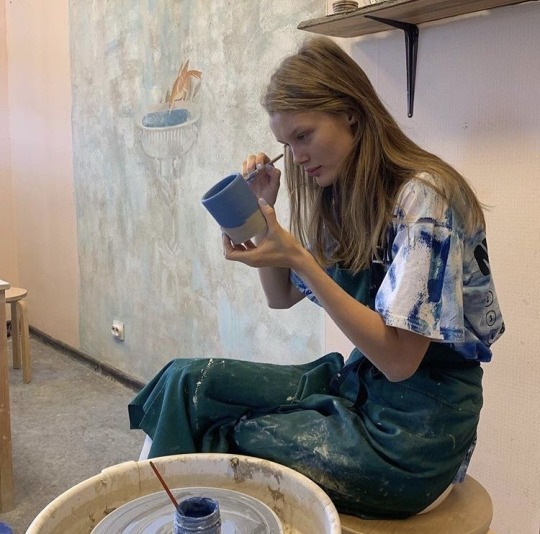


Explore art:
Tap into your creative side with painting, drawing, or sculpting. Art is not only therapeutic but also a fantastic way to express yourself and even decorate your space.
Reading:
Join a book club or set a personal reading challenge. From classic literature to modern thrillers, reading can expand your horizons and provide endless inspiration.
Get into gardening:
Whether you have a big backyard or just a small apartment balcony, gardening can be a relaxing and fulfilling hobby.Grow your own herbs, flowers, or vegetables!
Experiment with cooking:
Take on new recipes and cooking techniques. From baking bread to mastering the art of sushi, cooking can be both a practical skill and a creative outlet.
Try photography:
Capture the beauty around you and tell your story through the lens. Experiment with different styles, like portrait or landscape photography, and maybe even start a photo blog.
Practice yoga or meditation:
Incorporate mindfulness into your routine to reduce stress and enhance your overall well-being.
Learn to code:
Dive into the world of programming and build your own apps or websites. Coding is a valuable skill that can open up career opportunities and enhance your problem-solving abilities.
Challenge yourself with puzzles:
Engage your brain with jigsaw puzzles, crosswords, or brain teasers. It's a great way to relax and keep your mind sharp.
Try acting or improv:
Step out of your comfort zone and explore your theatrical side. Acting classes or improv groups can boost your confidence and creativity.
Travel and explore:
If possible, travel to new places, even if it's just a nearby town.Experiencing new cultures and environments can broaden your perspective and inspire new passions.
Try pottery:
Get your hands dirty and create beautiful, functional pieces with pottery. It's a relaxing and creative way to express yourself, and you'll end up with unique, handmade items.
Play games:
Board games,video games, or strategy games can be a great way to unwind and bond with friends.
Learn a new language:
Expand your horizons by learning a new language.It opens up opportunities for travel, cultural exchange, and even new career prospects. Plus, it's a fun and challenging way to keep your brain active.
Start a YouTube Channel or blog:
Share your passions, knowledge, or daily life through videos or written content. It's a creative outlet and a way to connect with like-minded individuals.
#aesthetic#glow up#glow up tips#it girl#study aesthetic#study blog#study inspiration#study motivation#that girl#study#that girl aesthetic#that girl moodboard#that girl outfit#becoming that girl#it girl aesthetic#it girl guide#glow up journey#glow up guide#glow up hacks#hobbies#pink pilates princess#n1pptips#studyblr#self love#self care#self improvement#becoming her#coquette aesthetic#coquette#wellnes girl
3K notes
·
View notes
Note
Hi Mindy! I’m a college student and I’m struggling to go to bed at a decent hour (think 3 am bedtimes every day) because of the amount of homework I have. Do you have any tips for time management so I can figure out how to get my homework done all during the day so I’m not losing sleep? (Any app recommendations or suggestions on how to schedule my day would be greatly appreciated). Thank you so much! I love your blog and I love seeing your posts🩷
how to get your life together & actually sleep: time management tips for college✨





hi love! 💌 first off, thank you so much for your sweet words. they genuinely made me smile. i’m so proud of you for wanting to improve your time management and prioritize your sleep (honestly, sleep is like the ultimate self-care, and you deserve it). i know college can feel like a whirlwind of assignments, deadlines, and just… life. staying up until 3 am is no joke, and it’s amazing that you’re ready to make a change. let’s make your routine feel a little more manageable and a lot more magical.
☁️ romanticize your productivity: first thing’s first: mindset. instead of viewing homework as this scary, endless task that eats up your nights, try to romanticize it. create a cozy study ritual. light a candle, make a cute study playlist (ex: lo-fi mixed with soft acoustics), and set up your space in a way that makes you actually want to sit down and work. i know it sounds silly, but giving your study sessions a soft, aesthetic vibe can make them feel less like a chore and more like a peaceful little routine. i have a lot of posts talking about this
🌙 break down your workload: sometimes it’s not about how much work you have but how it’s organized. take a few minutes in the morning or the night before to make a list of what you actually need to accomplish. break it down into small, bite-sized tasks. for example, instead of “study for chem exam,” write down “review chapter 4 notes,” “do practice problems,” and “make flashcards for key concepts.” checking off small tasks feels way more rewarding than staring at a big, vague to-do.
💡 create a time-blocking ritual: i’m obsessed with time-blocking because it feels like giving each task its own little home. instead of doing everything all at once (which is just chaos), dedicate specific chunks of time to each task. for instance:
🌼 9-10 am: review lecture notes
✨ 10-11:30 am: work on that essay (no distractions)
🍓 11:30-12: take a break, stretch, grab a snack
💻 12-1: group project research set timers to keep yourself accountable. i use the “focus keeper” app for 25-minute work sessions with 5-minute breaks. it’s surprisingly motivating!
📅 the magic of reverse scheduling: if you know you want to be in bed by, say, 11 pm, plan your day backwards from there. schedule your evening wind-down routine (like skincare, a little journaling, and tea) and work your way back through the hours, assigning tasks in reverse. this way, you’re prioritizing sleep as non-negotiable and shaping your day to respect that.
✨ my fave apps for dreamy productivity:
notion: perfect for creating aesthetic, organized to-do lists, study schedules, and even journaling about your progress.
flora: turns studying into a game by planting a virtual tree while you focus. if you leave the app, the tree dies (no pressure, right?).
toggl: tracks your time so you can see how long tasks actually take. it’s eye-opening to realize you might be spending way more time scrolling than studying.
clockify: like a little personal assistant that tracks your study sessions and breaks. it’s simple and kind of addicting to see how productive you’ve been.
habitica: makes productivity feel like an RPG game. complete with character upgrades when you check things off. honestly, it’s too cute to resist.
💖 mindy’s personal tips:
📝 batch similar tasks: do all your note-taking at once, then all your problem-solving. your brain doesn’t have to keep switching gears.
🎯 use the “two-minute rule”: if something takes less than two minutes, do it right away (like replying to emails or organizing your notes).
🕰️ the 1-3-5 rule: pick one big task, three medium tasks, and five small ones to accomplish each day. it keeps your to-do list from being overwhelming.
✨ romanticize rest too: treat your sleep as sacred. create a pre-bed routine that you actually look forward to, like reading a few pages of a lighthearted book or doing a little night yoga.
🌸 don't forget how important 'no' is: sometimes, we overcommit because we’re too nice to say no. it’s okay to protect your time! practice polite ways to decline extra responsibilities when you know they’ll eat into your sleep. like, “i’d love to help, but i have to focus on my assignments tonight. let’s plan something for the weekend!”
🌙 gentle evening wind-down: your body needs time to transition from productivity mode to sleep mode. about an hour before bed, turn off your screens, dim the lights, and switch to calming activities. i like using the “calm” app for guided meditations that feel like little bedtime stories.
🌱 become a morning person (yes, it’s possible)
one trick that really works is having something to look forward to. think of a tiny, indulgent ritual that you save just for mornings. maybe it’s a frothy matcha latte with vanilla syrup, journaling in a pretty notebook, or listening to your favorite podcast while you stretch. the key is to make mornings feel like a gift to yourself rather than just the start of a grind.
set your alarm to a song that makes you feel good!! something soft and happy. bonus points if it’s different from your usual playlist because it’ll feel special. place your phone across the room so you have to physically get up to turn it off. i also love using the “alarmy” app because it makes you solve a simple puzzle before it stops ringing (annoying, but effective).
once you’re up, avoid falling back into bed by making your bed immediately. it’s like telling your brain, “we’re up now. no going back.” then, try a quick, gentle morning stretch to wake your body up without feeling rushed. mornings can actually feel soft and peaceful if you give yourself permission to take it slow.
as for getting enough sleep the night before. make it non-negotiable. treat your bedtime like an important meeting you can’t cancel. remind yourself that a well-rested mind works way better than a sleep-deprived one. it’s all about romanticizing rest as part of your productivity rather than seeing it as wasted time.
give it a week, and see how you feel. even a small shift, like waking up 30 minutes earlier, can make your day feel more spacious and less chaotic. being a morning person is just about creating tiny habits that make mornings feel like a calm beginning rather than a rushed scramble.
🌸 micro productivity okay, let’s be real... sometimes the idea of sitting down for a three-hour study session feels completely overwhelming. that’s where micro productivity comes in. instead of blocking out huge chunks of time, break your tasks into mini-sprints that fit into the small gaps of your day.
for example, while waiting for your coffee to brew, you could make a quick list of your priorities for the day. during your commute or while you’re eating lunch, review your flashcards or skim your notes. those little moments add up, and suddenly your workload doesn’t feel as intense because you’ve been chipping away at it throughout the day.
one of my favorite apps for this is “quizlet.” you can make digital flashcards and quickly review them whenever you have a spare moment. or use “ankidroid” for spaced repetition. it’s great for subjects that require lots of memorization.
another trick? the “two-minute rule.” if a task takes less than two minutes, do it immediately rather than adding it to your to-do list. this helps clear out small, annoying tasks that tend to pile up (like replying to emails or organizing your desktop).
i also love the idea of micro journaling. sometimes, when you’re overwhelmed, writing down just one thought or feeling can give your brain the clarity it craves. it doesn’t have to be a full journal entry, just a few words that capture your mood or intention.
don’t underestimate the function of small wins. every tiny task you complete builds momentum and makes the bigger assignments feel more doable. it’s like telling yourself, “i’m already being productive today. let’s keep that energy going.”
the goal is to make productivity feel more like a series of little achievements rather than one massive to-do list. micro productivity helps you stay on top of things without burning out, and it feels way more manageable when your schedule is packed.
💫 stay motivated when your energy is low we’ve all been there. those days when your brain feels like it’s wrapped in a fog, and the idea of tackling your to-do list feels impossible. it’s okay to have low-energy days, but let’s find a way to work with them instead of against them.
first, check in with yourself. is your low energy from lack of sleep, stress, or just general burnout? sometimes just identifying the reason helps you figure out what kind of self-care you need. if you’re physically tired, maybe your focus should be on rest or low-effort tasks. if it’s more mental fatigue, try switching up your study space or doing something creative to break the monotony.
use the idea of “productive rest.” sometimes, resting doesn’t mean doing nothing. it can be as simple as switching tasks to something lighter, like organizing your notes or doing some gentle stretching while listening to a podcast related to your coursework. this way, you’re still moving forward, just at a gentler pace.
set up a reward system to motivate yourself. for example, after 20 minutes of studying, give yourself a 5-minute break to scroll through pinterest or listen to a song you love. use apps like “forest” to stay focused during your work session and then celebrate with a cute coffee break when your tree grows.
also, be kind to yourself. it’s okay if you’re not operating at 100% all the time. instead of pushing yourself to be overly productive, prioritize what actually needs to get done. sometimes, just getting one important task out of the way is enough for the day, and that’s completely valid.
remember, your energy levels fluctuate, and that’s perfectly normal. don’t pressure yourself to be endlessly productive. balance is key. the goal is sustainable productivity, not burning out from trying to do everything at once. listen to your body, adjust your pace, and know that it’s okay to take breaks when you need them.
💫 final thoughts: it’s all about balance, being productive during the day is great, but you’re human. you can’t be on 24/7. give yourself grace when things don’t go perfectly. the goal isn’t perfection; it’s progress. prioritize rest as much as you prioritize getting things done, and your mind (and grades) will thank you.
xoxo mindy

#time management#college tips#study hacks#productivity tips#sleep schedule#self improvement#academic success#college advice#study motivation#night owl problems#morning routine#glow up#study aesthetic#tumblr studyblr#productive life#wellness tips#glowettee#mindy’s tips#soft girl lifestyle#cozy productivity#self care routine#girlblogger#becoming that girl#it girl energy#pink#diary#leveling up#level up journey#healing#self love
189 notes
·
View notes
Text
tips for stem majors in math and science courses (spoonie + neurodivergent friendly)
hi y’all! my nameis lila and i’m a 28 year old physics and anthropology major who’s about 2 years through college (in the US)! as we’re coming up on the start of the fall ‘23 college semester, i thought i might share some really solid hacks for fellow STEM students taking science and/or math courses that i’ve basically built my college academic career on. and! these study tips are spoonie and adhd friendly! as a matter of fact, a lot of these are tips/methods that specifically work for me as a neurodivergent spoonie (i have pretty severe adhd, as well as POTS and ME/CFS), but that i think non-disabled/non-spoonie and/or neurotypical students could also benefit from using! so with out any further ado, here are my 7 tried and true study hacks for college math and science classes…
1) discover your learning style and tailor your studying towards leveraging it.
you’ve probably heard of visual, audio, and kinesthetic learning styles, but did you now there’s actually way more learning styles than just those three? i’m personally a “social learner,” meaning i learn best through discussion and socialization with 1+ other people to interact with. this could look like teaching other classmates concepts and methods that we’ve learned or discussing ideas with classmates and/or professors until i fully understand the concepts at play and how they connect and can reflect them in performing analysis and application, etc. honestly, figuring out my learning style was hands down one of the most helpful things i’ve done in college. it has allowed me to choose professors who i will mesh better with in terms of how they teach, as well as to adapt materials and methods to my style of learning in order to master them quicker and more effectively.
2) rewrite your notes after lecture, for the love of god.
this tip actually comes from my high school IB Math HL teacher, who told me to do this when i originally left high school for college. even if you think you’ve mastered the basics of the topic covered during the lecture, rewriting those notes after lecture helps really hammer in the knowledge that you’ve already established and also helps to get the wheels turning on pieces of information you might have less of a grasp on. try tp set aside at least 30 - 40 minutes after class to just rewrite your notes and try to really digest the information.
3) body doubling is one of the most beneficial things ever to be invented even if you’re not adhd, and i WILL die on that hill, thank you very much.
“body doubling” or “having an accountabilibuddy” are interchangeable terms in the adhd community that mean you have one or more consistent study buddy/buddies who you do all the homework and/or studying with in person on a regular basis, even if you’re just working next to each other in total silence. this does a couple of things. first off, it forces homework/assignments/studying to become a concrete social obligation you need to regularly show up for, rather than a nebulous obligation based on an invisible deadline. second off, it gives you 1+ partners to work out your problems concerning course topics with. third off, it allows you to build a network of peers where you feel comfortable helping each other with course material (this is especially great because it’s likely you and your classmates have different strengths regarding course content). tbh, body doubling is the other method that i, personally, have found most useful in college and i highly recommend trying it, even if you don’t have adhd.
4) teach others/your classmates the analysis and application methods you’ve learned, even if those methods aren’t 100% solidified for you (trust me on this).
the goal of stem courses is never memorization, but rather being able to understand a topic well enough to analyze a similar situation and apply the what you’ve learned creatively. this is where teaching others comes in. in order to teach others a concept and its related analysis and application well, you have to have at least a fraction of a decent understanding of these things yourself, and, further, often time in teaching these things you also learn to grasp the concepts/aanalysis/applications even better than you did before with each new teaching session. basically: teaching others is a creative way of also teaching yourself. you get the benefits of repetition, of thinking about a concept/technique/analysis and application in a new way, and of getting to apply the concept/technique/analysis and applicatioin to a new scenario each time. plus, you’ll typically make friends quickly in the process! there’s really no downside to this tip imo ;-)
5) utilize your college’s tutoring center/program(s), even when you don’t think you need to.
usually colleges have either set up a general “tutoring center,” on campus where you can find tutors for all different kinds of topics and courses available during regular hours for walk-in sessions and/or appointments free of charge or departments will hold regular weekly (or twice weekly) free on-campus tutoring sessions for specific courses. regardless of which of these options your college has, i highly recommend attending at least one tutoring session/appointment (ideally with the same tutor if/when you eventually find one you click with) every single week, even when you don’t feel like you’re struggling with the topic(s) covered in that week’s lecture. this will help you review topics and techniques covered in lecture, deepen your understanding of them, and, if nothing else, it’s an excuse to get homework out of the way while having someone else there who can help you if/when you get stuck. attending at least one session weekly also helps you get into a habit and routine of keeping up with your assignments, so you’re not left scrambling at the last minute before they’re due.
6) if you have accommodations, request access to record lectures. if you do not have accommodations, ask your professor if you are allowed to record lectures. IF YOU RECORD LECTURES, DO NOT FORGET TO REVIEW THEM!
okay, so first up for my fellow spoonies and neurodivergent peeps: when you apply for/renew your accommodations, make sure that “recordinng lectures” is on your MOA (memorandum of accommodations), because so long as it is, your professors legally cannot deny you permission to record lectures without risk of themself and the college being sued for an ADA violation. also, make friends with a classmate and ask them to record lectures and send them to you if/when you are absent (let the professor know that you’ve asked this classmate to record and send you the lecture if you are absent)
now, if you aren’t disabled, a spoonie, and/or neurodivergent, you aren’t guaranteed permission to record lectures. however. ask the professor if you can have their permission to audio record lectures (be sure to also let them know that such a recording would be for personal use only and that you don’t plan on distributing the recordings). i’ve found that many professors don’t mind you having an audio recording.
even if you aren’t an audible learner it can be really useful to have these recordings to review at a later point. oftentimes reviewing lecture recordings can be useful if you glazed over and missed a section of the lecture and/or if you can’t remember what a professor taught during a section of a lecture.
7) last but not least, on a related note, if you have accommodations, also request access to your professor’s lecture notes. if you don’t have accommodations, check if your professor posts their lecture notes for students to use.
having your professor’s notes can be extremely useful for review purposes, but they can also help you understand where your professor is going with course content and what they want to stress as important.
#studyblr#study tips#study hacks#adhd studyblr#adhd study tips#adhd#spoonie#college studyblr#college study tips#college study hacks#disability#chronic illness#collegeblr#college#uni#uniblr#university#tips and tricks#text#mine
274 notes
·
View notes
Text
Academic/Study YouTubers
I will be updating this post from time-to-time, so please feel free to add more resources/channels in the comments!
ACTIVE CHANNELS
Ali Abdaal
Amy Wang
CrashCourse
Gohar Khan
Study To Success
INACTIVE CHANNELS
studyquill
The Bliss Bean
Thomas Frank
#studyblr#university#student#student life#uni student#university student#collegelife#college#college life#college student#high school#study tricks#study advice#study hacks#study motivation#study blog#studyspo#study aesthetic#studying#study tips#study#useful stuff#study youtubers#study inspiration#study notes#study inspo#study goals#academic weapon#studyblr community#academic victim
57 notes
·
View notes
Text
How I Deal with Tough Days When My Brain Won't Let Me Work
We all have those days where productivity feels impossible. It’s like no matter what we do, we just can’t seem to get started. I’ve come to realize that, for me, these days aren’t just about laziness or lack of motivation—it’s more complex. When I procrastinate, it’s often my creative brain, or what I like to call my “inner child,” throwing a tantrum.
Step 1: Understanding the Procrastination
The first thing I do is pause and try to understand what I’m running away from. Is it the overwhelming amount of work? In that case, I break it down into smaller, manageable bits. When the material feels boring, I add some fun—by creating colorful and funny interpretations of definitions or concepts. I turn words into weird characters, almost like a cartoon in my mind. Sometimes, I’ll turn it into a game, like seeing how many questions I can get right, or even trying new study techniques like rewriting a sentence or reading it out loud.
I find that when I’m bored, it’s a perfect opportunity to experiment. I might try drawing funny sketches of the material or use quirky interpretations to make it more interesting. The key is that I have to figure out what’s causing the procrastination—is it fear, perfectionism, or just the sheer volume of work?
Step 2: Naming My Inner Child
Once I understand what’s happening, I like to give my inner child a friendly name. This helps me communicate with it when things get tough. Every time I mess something up and feel like quitting, I know that it’s just my inner child reacting to the idea of perfectionism. Naming it makes it less scary, and I feel more in control of the situation.
A perfect example would be the time I noticed that my inner child shows up in my skincare routine, but not because I’m lazy—it's because I feel unmotivated when I don’t have enough of those colorful, trendy products, like the ones all over TikTok. You know, the Drunk Elephant skincare, with its fun packaging that every influencer seems to have. It taps into the same idea as “Sephora kids,” where even as adults, we’re drawn to overconsumption of things we don’t actually need, just because they’re colorful or trendy or aesthetically pleasing.
But I’ve realized that I don’t need fancy, colorful products to wash my face before bed. My inner child might crave those items, but recognizing that helps me let go of the unnecessary pressure to follow trends. I focus on the routine itself, rather than what’s missing from my shelf.
Step 3: Clearing the Distractions
Next, I clear my desk. Anything that’s not a school supply or a tool I need for work can be a distraction, especially if it’s colorful or unrelated to my task. I set a 5-minute timer and start working, just to show my inner child that it’s really not that scary. Once the timer’s up, I double it, taking short breathers in between. I repeat this until I feel like I’ve done enough for the day.
Step 4: Knowing When Enough Is Enough
After a certain point, I trust my own judgment. I ask myself honestly, “Is this enough for today?” If I feel like I’ve given it my best shot, I let go of the need to do more. I accept that some days will be harder than others, and that’s okay. The important thing is that I’m not fighting my inner child, but working with it.
It’s a simple process, but it’s effective. Instead of battling myself, I’ve learned to communicate with that part of me that gets overwhelmed, bored, or perfectionistic. By understanding and breaking things down, I can get through even the toughest days without feeling like I need to drop everything.
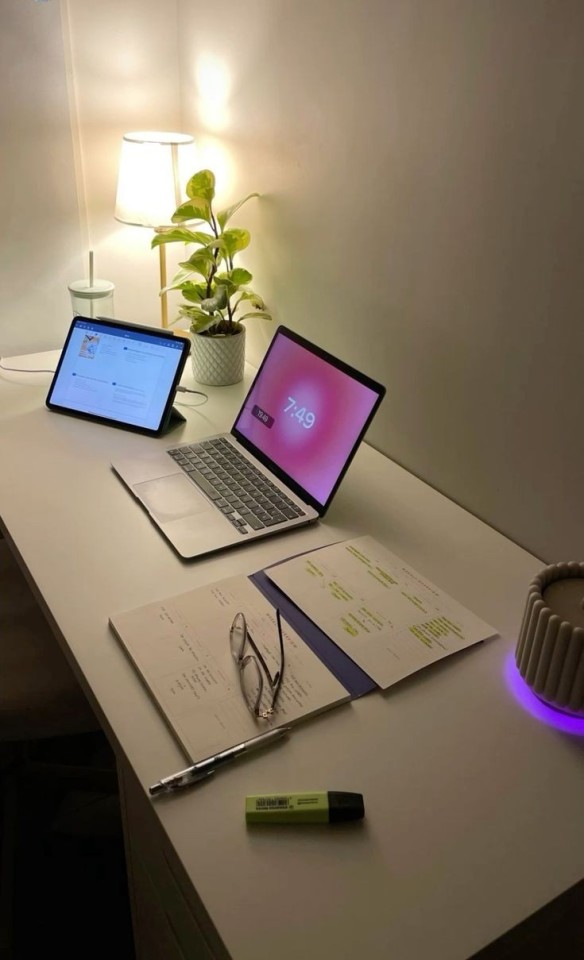
P.S.: I’ve struggled to stay productive most of my life, and a part of that was because I didn’t grow up in one of those aesthetically pleasing, western-style homes you always see on social media. I live in the Balkans, and my bedroom looked nothing like that. It wasn’t perfectly curated or full of trendy decor, but over time, I grew to love my culture and my surroundings. Even though I wasn’t the richest or living the most "aesthetic" lifestyle, I’ve learned that what I have is enough, and it doesn’t define my ability to be productive or happy.
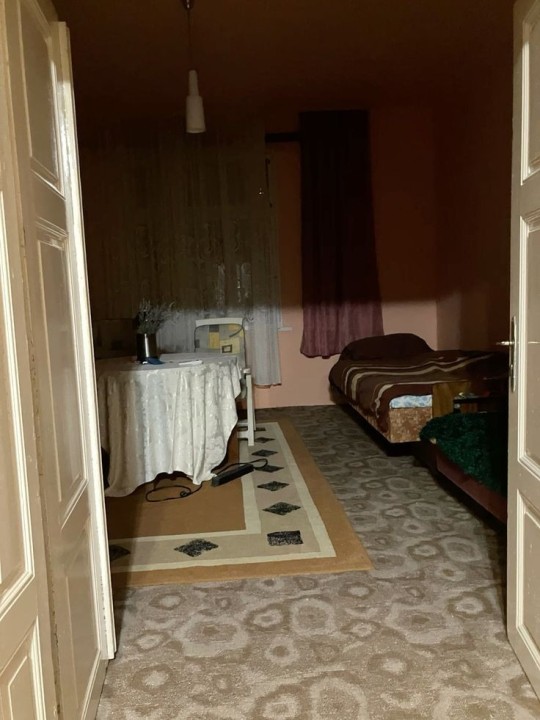
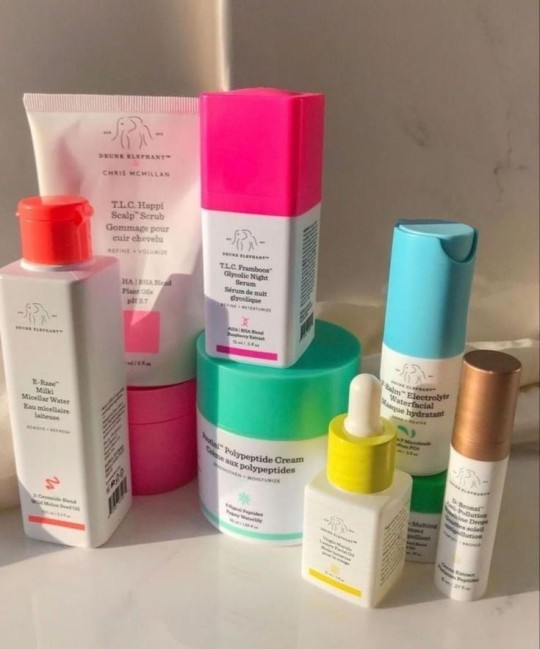
#productivity#productive#100 days of productivity#girlblogging#discipline#aesthetic#femininity#self care#self development#self help#self improvement#street style#bedroom#balkan#study blog#study motivation#student#studyspo#study aesthetic#study tips#study time#study#skincare#girl blogger#david goggins#psychology#cognitive#deep thoughts#ranting#study hacks
35 notes
·
View notes
Text

THE 3-2-1 METHOD
If you come home tired after school, here's a way to continue studying.
Take two minutes to do physical activity (dancing, jumping). This will help you to perk up.
Take two minutes to do breathing exercises. This will help you calm down.
Take one minute to prepare for and focus on your studies.
This method will help you to keep being productive and to start studying.
I hope you'll try it, good luck (◕‿◕✿)
#aesthetic#study motivation#study aesthetic#study blog#study notes#studyblr#studyinspo#study tips#rory gilmore#study habits#study hard#study hacks#study help#study method#study studying studygram studyblr studyabroad studyhard studyspo studymotivation studytime studyinspiration studyinspo studyaccount studyblo#studying#study abroad#study advice#studyspo#study
33 notes
·
View notes